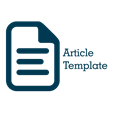Robust Canonical Correlation Analysis on Leakage Current Behaviors of Geothermal Polluted Porcelain Insulators
DOI:
https://doi.org/10.18196/st.v12i2.732Keywords:
CCA, FMCD, geothermal, leakage current, porcelain insulatorAbstract
This study presents the leakage current measurements results of three natural geothermal polluted porcelain insulators. The insulators consisted of one new-clean insulator, as reference, and three polluted insulators. The carried out measurements were leakage current and applied high voltage waveforms, used a two-channel storage digital oscilloscope, in a hermetically sealed chamber, where temperature, humidity, pressure and applied voltage amplitude could be adjusted and measured simultaneously. The leakage current waveforms were analyzed using the FFT and the statistical concerns were analyzed by the Fast-Minimum Covariance Determinant (FMCD) of robust multivariate statistical tools, and canonical correlation analysis (CCA). The result indicated that after the fundament, the second highest of harmonics leakage current were fifth harmonics. The leakage current waveforms were significantly influenced by humidity, besides pollution. The dependent or output variables are linear functions of independent or input variables. Based on CCA, the dependent parameters depended on input parameters tightly, with the canonical correlations were more than 0.99. The leakage current amplitudes were still predominantly influenced by applied voltage amplitudes, where the phase angles and THD were slightly influenced by relative humidity. On these experimental measurements, the insulators were still in normal operation.
Downloads
How to Cite
Issue
Section
License
Semesta Teknika is licensed under a Creative Commons Attribution 4.0 International License.
Authors who publish with this journal agree to the following terms:
- Authors retain copyright and grant the journal right of first publication with the work simultaneously licensed under a Creative Commons Attribution License that allows others to share the work with an acknowledgement of the work's authorship and initial publication in this journal.
- Authors are able to enter into separate, additional contractual arrangements for the non-exclusive distribution of the journal's published version of the work (e.g., post it to an institutional repository or publish it in a book), with an acknowledgement of its initial publication in this journal.
- Authors are permitted and encouraged to post their work online (e.g., in institutional repositories or on their website) prior to and during the submission process, as it can lead to productive exchanges, as well as earlier and greater citation of published work (See The Effect of Open Access).








